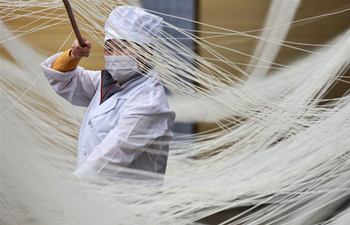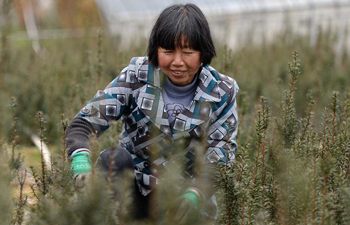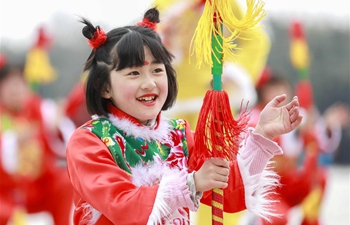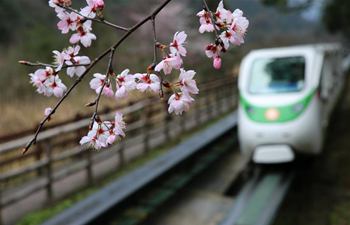XI'AN, March 6 (Xinhua) -- Thirty-seven years ago, birds specialist Lu Baozhong was the chief-caretaker of seven crested ibis, which were found in Yangxian County of northwest China's Shaanxi Province.
Until the discovery of wild crested ibis in 1981, the birds, once common in Japan, China, Russia and the Korean Peninsula, were thought to be extinct in the wild.
"In 1981, I graduated from an agricultural institute and started to work in the Yangxian county forestry bureau. I happen to have attended training and seen a specimen of the crested ibis, which made me eligible for protection of the birds after they were found," Lu said.
Before retirement, Lu was the deputy director of the Crested Ibis Nature Reserve Administration in Hanzhong City in Shaanxi Province. The only reserve of its kind in China.
"Thirty-seven years ago, after the discovery of the birds, we began to speed up conservation efforts of their habitats. All economic projects that may pollute the environment in Yangxian County were halted. We had special funds to persuade farmers not to use pesticides and fertilizers in designated areas," he said.
Crested ibis feed mainly on mud fish, crabs and insects. "During the incubation period, we caught fish and insects and dropped them in wetlands for the ibis. From 1981 to 1990, the number of ibis grew to 50," Lu said.
After years of conservation, the crested ibis population has been growing steadily, according to the local forestry department.
Now the population of crested ibis is more than 2,600 in China, including about 1,800 living in the wild. About 2,000 crested ibis live in in Shaanxi Province. Their habitat takes up around 14,000 square kilometers.
In 1995, Lu and his colleagues artificially hatched the first crested ibis.
"We have continued to draw experience from breeding and now our techniques and methods are quite effective," he said.
Workers arrange the cages of ibis to be similar to their natural habitat.
"Crested ibis are easily frightened and vigilant. They can easily be disturbed by unfamiliar things or odd sounds. We once had an ibis injuring itself while it tried breaking out of the cage," Lu said.
In order to reduce risks for the birds, Lu and his colleagues use soft nets and create buffer zones for the bird sheds. They also have stringent disinfection requirement for the cages.
In Shaanxi Province, there are about 600 artificially bred crested ibis.
"This year, we will release another batch of the birds to the wild. We are formulating a set of standards for bird-releasing as reference for others, so that together we may improve our conservation work," Lu said.

















